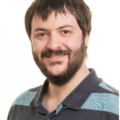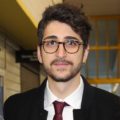Multiscale structuring for two-step catalysis and sensing: generating and manipulating sub-micrometer sized droplets at high volumes
Joint Doctorate
1st supervisor and 1st promotor: Prof. Jan Eijkel (UT)
2nd supervisor: Prof. Detlef Lohse (UT)
2nd promotor: Prof. Alfons van Blaaderen (UU)
Co-promotor: Associate Prof. Mathieu Odijk (UT)
Affiliation: University of Twente and Utrecht University
Research theme: Storing Electricity from Renewable Sources in Chemical Bonds
Microfluidic droplet generators are established tools to synthesize (catalyst) particles. Generally however they have been severely limited in droplet throughput (#/s), produced droplet dimensions (> 1mm diameter), and also lacked combinatorial possibilities to build custom assemblies of different catalyst particles. Advanced droplet manipulation, such as paired droplet formation, droplet merging, droplet shrinkage, double emulsion (droplet-in-droplet) preparation or droplet splitting have been previously applied e.g. in single cell analysis. These tools would present us with the solutions to address the goals listed above to create advanced catalyst particles by directed self-assembly.
In this project, the aim is to produce a new generation of droplet generation chips for high-volume production of custom designed catalysts using self-assembly. The basic fluidic building block would be a unit for high-throughput production of sub-micron sized droplets of high monodispersity. This scale-up of production would allow for novel ways of catalyst particle analysis, traditionally problematic to conduct at lower volumes. Additionally, these droplet generator chips will be extended with the previously mentioned advanced droplet manipulation techniques of pairing, merging, shrinkage, splitting and double emulsion preparation.
Keywords:
- Droplet microfluidics
- Droplet manipulation
- Self-assembly
- Particle synthesis
- Microfabrication








